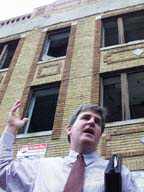The city will finally pay a consulting firm that helped engineer a sale of delinquent properties in 1993, a sale that helped infuse millions of dollars into the city’s budget. “We know this isn’t the most popular thing in the world,” said Bret Schundler’s chief of staff, Tom Gallagher, last week, “but we have an obligation to pay them.”
The city wound up garnering $38 million from the sale and another $5.3 million worth of property, and the move was looked at as an innovation. But it was not without its detractors, as some Schundler critics still charge that it should have brought in millions more.
The City Council voted Wednesday to pay $226,125 to the Manhattan financial consulting firm Lepercq, DeNeuflize & Co., who helped structure a bulk lien sale and aided in a subsequent suit the city filed. That suit, against one of the servicers, Breen Capital Services Corporation, was eventually settled last November for $6.25 million. Part of the money went into the city’s Fiscal Year 2000 budget.
The mayor had hoped that Lepercq would be paid from money resulting from the sale. But when Breen, the collector of the liens, came up short and, in the minds of the city, was derelict in its duties, payment was held off.
It all started with an idea by Mayor Bret Schundler. In 1993, he bundled the city’s more than 5,000 delinquent tax liens and sold them to institutional investors. The sale helped lower taxes and get Schundler re-elected later that year.
But the deal was beset with problems. Breen, a “sub-servicer” for Bankers’ Trust, stopped collection on many of the properties, a move that cost the city millions in revenue. The city sued and eventually won the $6.25 million and the return of some 340 properties to the city.
Some Schundler critics have charged that the city should have gotten more from the sale.
“The bottom line is, the taxpayers are already out $20 million for the sale,” said Ward A Councilman Robert Cavanaugh last week.
But people like Cavanaugh want it both ways, said Gallagher.
“When we proposed [the sale], they said, ‘you’re nuts,'” he said, “and then, when it works, they say, ‘Well, you didn’t get enough.'”
Cavanaugh’s figures don’t reflect the real world, said Gallagher.
“The city tried to sell those properties previously, and the city got zero dollars for them,” he said. “And we got the collection rate from 78 percent to 99 percent.”
Still, the city only collected 70 cents on the dollar for the properties.
The money to Leqercq will be coming out of the 2000-01 budget, according to Gallagher.
